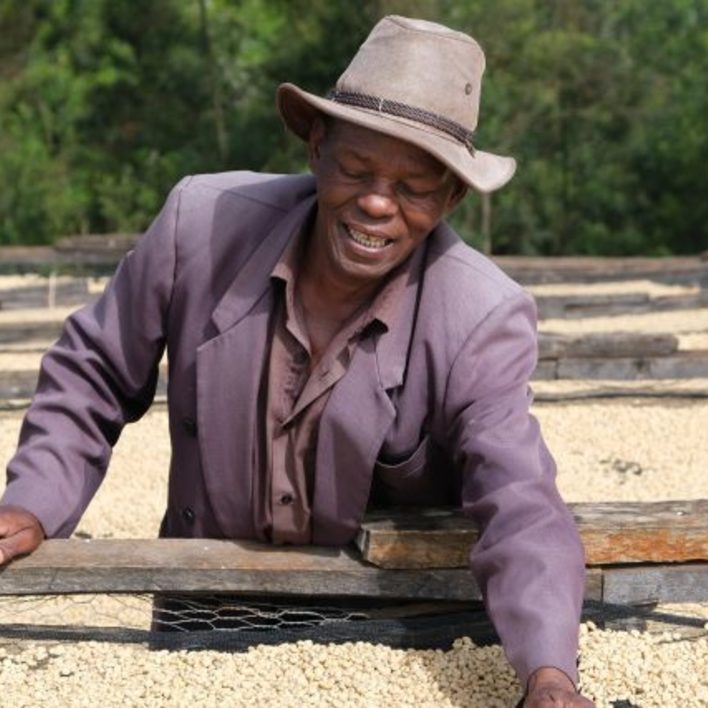Roast Level from the Roaster
Refers to the roast level in comparison with other coffees from the roaster
Light



Variety
SL28
Process
Washed
Elevation
1,600 - 1,900 masl
Region
Kiambu

About Ndundu of Kenya
Kiambu county sits adjacent to Nairobi, Kenya’s capital city, and is a coffee powerhouse. Along with an extensive community of coffee mills, exporter warehouses, and quality labs, the Kenya Coffee College and Coffee Research Institute (near Ruiru Town, after which the disease-resistant hybrid is named), Kiambu is also home to many of Kenya’s largest and oldest coffee estates. Because of its proximity to Nairobi, Kiambu is urbanizing quickly. Ruiru Town is Kenya’s 6th largest urban municipality and if development continues the way it has, many expect a majority-urban county in just a few years. Yet Kiambu continues to be home to some of Kenya’s most established producer groups, including Thiririka Farmers Cooperative Society (FCS), which is also the largest cooperative in the county.
Kenya’s coffee is dominated by a cooperative system of production, whose members vote on representation, marketing and milling contracts for their coffee, as well as profit allocation. The Ndundu processing station, or “factory” as they’re known in Kenya, has over 1000 contributing farmer members and is one of 3 total factories that comprise its local farmer cooperative society (FCS), called Thiririka. Kenya is of course known for some of the most meticulous at-scale washed processing that can be found anywhere in the world. Bright white parchment, nearly perfectly sorted by density and bulk conditioned at high elevations is the norm, and a matter of pride, even for generations of Kenyan processing managers who often prefer drinking Kenya’s tea (abundantly farmed in nearby Muranga county) to its coffee.
Ndundu factory is no exception: cherry is delivered each day by participating cooperative members, sorted for ripeness, and then depulped and fermented overnight. Once fermentation is complete it is washed with freshwater in long channels and sorted by density into “P1” (the highest quality), “P2”, “P3”, and “P light”. Each density grade is dried individually on raised beds between 15 and 21 days and stored separately for conditioning on the factory property. Ndundu factory, like more and more factories in central Kenya, skips the post-fermentation soak in favor of expediency and chooses instead to let the washing stage clean the parchment to spec. “14NG0009” in the title refers to this coffee’s “outturn” number. Outturn numbers are unique microlot codes that are given to each and every batch of parchment delivered to dry mills from individual factories or estates anywhere in Kenya, and are the units on which Kenya’s entire microlot export system is built. Outturns in Kenya are tracked with a shorthand code that places the specific batch of parchment coffee in time, place, and sequentially with other coffees.
Kiambu, Kenya
Theory Coffee Roasters
Roasting coffee was originally an escape fantasy/retirement dream for owner Sam LaRobardiere, until roasting equipment and some green coffee basically fell into his lap. Then as a hobby roaster, he began selling at a pop-up for community events and artisan markets, and in 2018 took the leap to open both a roastery and coffee shop.
Over the years, the folks at Theory Coffee Roasters have honed their coffee skills and built strong coffee-sourcing relationships. Along the way, they have had some fun achievements. Theory brought home the gold medal in the highly competitive espresso category at the nation’s largest roasting competition, Golden Bean North America, in 2018. Theory placed top 10 Overall in the Good Food Awards 2019. Shortly after, Theory Competed against 8 other roasters and won the Twitter Headquarter’s Brew-Off competition in 2019 becoming the sole coffee provider for the Twitter HQ in San Francisco. Theory was also included in the Food & Wine Magazine’s 100 Best Coffee Shops in America in 2019. They were also named as one of the top 30 Coffee Roasters in North America in Fresh Cup Magazine. Joel Lohner, roasting and production manager, placed as one of the top 3 in cup tasters at the Coffee Champ competition. Sam LaRobardiere and Joel Lohner both received their Q-Grader license, which is the equivalent to a wine sommelier in the coffee industry.
While Theory is motivated by the great accomplishments of the past, we continue to be even more excited about the future. Our commitment is to continue to bring our beloved customers even more award-winning coffees that are roasted to display the optimal balance of each coffee's best attributes. You can buy with confidence that Theory will deliver the best coffees in the world...right to your doorstep.
